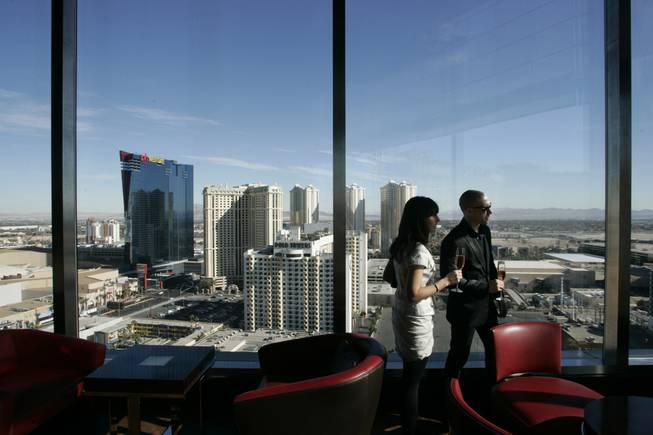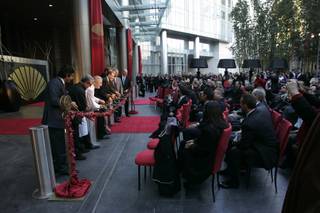
Bram and Sarah Tihany take in the view from the Mandarin Bar at the grand opening of the Mandarin Oriental at CityCenter on Friday, Dec. 4, 2009.
Saturday, Feb. 26, 2011 | 2 a.m.
Mandarin Oriental Las Vegas
CityCenter's Mandarin Oriental makes it's Las Vegas debut.
Sun coverage
Beyond the Sun
Sun archives
In the months before CityCenter opened, it seemed there couldn’t be enough hand-wringing over the awful timing: the christening of an $8.5 billion resort complex in the middle of the Great Recession.
The naysayers wondered how long before CityCenter would cough and gasp for air before maybe it would start making money.
The answer is now in.
Just about every part of CityCenter is making money on its anniversary — except one.
Disappointing results at Mandarin Oriental, a small, superluxury hotel that is taking steps to boost business — is the latest example of how Las Vegas lags behind the national recovery in certain segments of the economy.
Nationally, high-end hotels are faring better than budget counterparts as customers pay up for finer digs at discount prices. Upscale hotels also attract those who can most afford to travel.
Similarly, higher-end hotels are outperforming budget hotels on the Strip.
However, even the town’s finest hotels haven’t experienced the recovery that luxury hotels have in many other cities, and are still selling rooms at depressed prices.
“As a discretionary market, Vegas seems to be its own dynamic,” said Patrick Bosworth, a partner with Duetto Consulting in Las Vegas. Many guests of the town’s poshest hotel rooms are big gamblers who don’t pay a dime to stay in comped rooms.
Las Vegas’ upscale hotels attract many “aspirational” customers who might be spending more than they can typically afford, he said. Such customers, he said, tend to be less well-traveled and more sensitive to price increases.
Although an improvement in business travel helps boost profits for high-end hotels across the country, conventiongoers account for less than 20 percent of the rooms booked in Las Vegas. That limits the recovery’s benefit for casinos, and especially nongambling hotels such as Mandarin that lack large convention centers, Bosworth said.
By one earnings measure reported this month by MGM Resorts International, Mandarin reported a loss of $1.3 million in the fourth quarter, but Aria — buoyed by its casino — made $30.1 million, Crystals mall made $6.1 million and its casino-free Vdara condo-hotel tower made $949,000. These figures represent earnings before interest, taxes, depreciation and amortization, a primary performance indicator for investors.
Bermuda-based Mandarin Oriental Hotel Group manages the hotel and shares earnings with MGM Resorts, which did not disclose the property’s fourth-quarter occupancy or room rates.
The 400-room Mandarin, known for its hushed atmosphere and attentive, formally dressed staff, has been forced to drop prices along with other high-end competitors in Las Vegas. This month, the property is offering guests who stay two nights a third night free, in addition to free breakfast and a $100 spa credit.
Mandarin opened with prices that couldn’t be justified in the recession but has since lowered them to a competitive level that should help the hotel, said Bill Lerner, an industry analyst and principal with Union Gaming Group in Las Vegas.
“I expect there’s been some debate between (MGM Resorts) and Mandarin, as the management company, about what the market will bear,” he said.
Farther north on the Strip, Encore opened with depressed rates that undercut competitors in December 2008, as business slowed in Las Vegas.
Aria lowered rates not long after it opened a year later, when it became clear that a recovery wasn’t imminent.
MGM Resorts CEO Jim Murren called Mandarin’s results “disappointing” in light of improving earnings, helped by the recovering convention trade, at CityCenter’s other hotels. Murren said it’s understandable, though, as the Mandarin brand is known among international travelers but isn’t necessarily familiar to visitors of Las Vegas, where casino brands dominate.
To improve Mandarin’s fortunes, MGM Resorts has stepped up cross-marketing efforts between Mandarin and other company-owned properties in Las Vegas that include drawing Mandarin customers to gambling and nongambling events at other resorts, Murren said.
Mandarin made some money in January, when it was sold out a couple of weekends for the first time, Murren said. January was a good month for MGM Resorts and the Strip as a whole, as roughly 10 percent more attendees than January 2010 descended on Las Vegas for its biggest annual trade show, the Consumer Electronics Show.
During the show, several budget hotels charged from $200 to $300 and higher-end properties charged from $400 to $600 for rooms that would otherwise cost half that. Some analysts wonder whether such improvements are sustainable, as the first three months of the year typically account for as much as 40 percent of Las Vegas’ convention trade for an entire year.
Mandarin spokeswoman Alyssa Bushey said the boutique hotel has aggressively marketed its brand locally since it opened in December 2009, though the property last month hired a new director of sales and marketing, Diane Yost, to help those efforts. Yost previously led sales and marketing for the Ritz-Carlton hotel in Grand Cayman and has worked for the Four Seasons chain. The hotel’s latest marketing efforts are expected to tout its recent Five Diamond rating by AAA and its Five Star spa rating from Forbes, Bushey said.


Join the Discussion:
Check this out for a full explanation of our conversion to the LiveFyre commenting system and instructions on how to sign up for an account.
Full comments policy